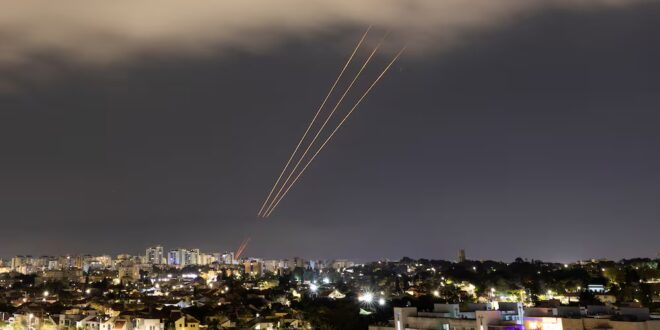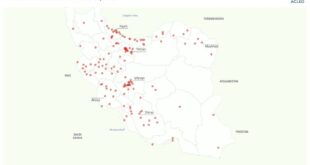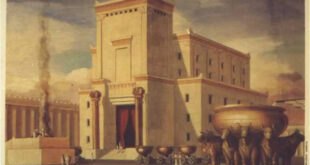Iran launched an unprecedented drone and missile barrage against Israel late on Saturday in a retaliatory strike that raised the threat of a wider conflict in the region.
The move could trigger a major escalation as tensions in the Middle East remain inflamed over the war in Gaza.
What prompted Iran’s attack?
Iran’s Islamic Revolutionary Guard Corps said it was responding to an April 1 air strike on its Damascus consular section. Two generals and seven members of the IRGC were killed in the strike, which Tehran blamed on Israel.
The attack was expected as Iran had repeatedly threatened to retaliate after the air strike. The US had warned repeatedly that an Iranian reprisal was imminent.
Ahead of the attack, several countries in the region started to shut down their airspace.
How did Iran carry out the attack?
Iran launched more than 300 drones and missiles at Israel overnight, 99 per cent of which were shot down, the Israeli military said on Sunday, adding that the armed forces remained fully functional and were discussing follow-up options.
Iran’s allies in the region joined the attack, with Yemen’s Houthi rebels reportedly also launching drones at Israel, according to security agency Ambrey. Lebanon’s Iran-backed Hezbollah militia announced it had fired rockets at Israeli positions in the occupied Golan Heights at about the same time, as well as a second barrage hours later.
Israeli military official Admiral Daniel Hagari said Iran launched 170 drones, 30 cruise missiles and 120 ballistic missiles at Israel.
Most of the drones or cruise missiles didn’t reach Israeli airspace, but some of the ballistic missiles hit the Nevatim Airbase in southern Israel, he said.
“The vast majority of the missiles were intercepted outside of the State of Israel’s borders by our Aerial Defence Array.”
He said Iran’s action was “very grave” and would “push the region toward escalation”.
Syria, an ally of Iran, said it was putting its ground-to-air defence systems near the capital and major bases on high alert, according to army sources.
How did the US respond to the attack?
The US, Israel’s main ally, helped take down “nearly all” the drones and missiles fired by Iran, US President Joe Biden said, adding that he had reaffirmed his “ironclad” support for Israel in a phone call with Prime Minister Benjamin Netanyahu.
Mr Biden said he would convene fellow leaders of the G7 group of wealthy nations on Sunday to co-ordinate a “united diplomatic response” to the “brazen” attack.
“Iran – and its proxies operating out of Yemen, Syria and Iraq – launched an unprecedented air attack against military facilities in Israel. I condemn these attacks in the strongest possible terms,” Mr Biden said.
How have other countries reacted?
British Prime Minister Rishi Sunak condemned the “reckless” strikes, which he said “risk inflaming tensions and destabilising the region. Iran has once again demonstrated that it is intent on sowing chaos in its own backyard.”
China’s Foreign Ministry also urged restraint, characterising the attack as “the latest spillover of the Gaza conflict” and calling for the implementation of a recent UN Security Council resolution demanding a ceasefire there, saying the “conflict must end now”.
France’s Foreign Minister Stephane Sejourne said on X that “in deciding to take this unprecedented action, Iran has reached a new level in its acts of destabilisation and is risking a military escalation”.
Germany’s Foreign Minister Annalena Baerbock also warned the attack would have a destabilising effect, and urged Tehran to halt the strikes.
Egypt’s Foreign Ministry expressed its “deep concern” at the escalation of hostilities and called for “maximum restraint”.
The Saudi Foreign Ministry voiced its concern at the “military escalation” and called on “all parties to exercise utmost restraint and spare the region and its peoples from the dangers of war”.
 Eurasia Press & News
Eurasia Press & News




